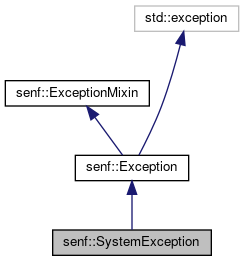senf::SystemException Class Reference
Exception handling standard UNIX errors (errno) More...
#include <senf/Utils/Exception.hh>
Inheritance diagram for senf::SystemException:

Public Member Functions | |
| int | errorNumber () const |
Error code (errno number) More... | |
| char const * | errorString () const |
Error string (strerror() value) More... | |
| bool | anyOf (int c0, int c1=0, int c2=0, int c3=0, int c4=0, int c5=0, int c6=0, int c7=0, int c8=0, int c9=0) const |
true, if errorNumber() is one of c0 ... c9 More... | |
 Public Member Functions inherited from senf::Exception Public Member Functions inherited from senf::Exception | |
| virtual | ~Exception () throw () |
| virtual char const * | what () const throw () |
| get exception description and backtrace if available More... | |
 Public Member Functions inherited from senf::ExceptionMixin Public Member Functions inherited from senf::ExceptionMixin | |
| std::string | message () const |
| get exception description More... | |
| std::string | backtrace () const |
| Return backtrace (if available) More... | |
| void | append (std::string text) |
| Extend exception description. More... | |
Structors and default members | |
| SystemException (std::string const &descr="" _SENF_EXC_DEBUG_ARGS) | |
| SystemException (int code _SENF_EXC_DEBUG_ARGS) | |
| SystemException (std::string const &descr, int code _SENF_EXC_DEBUG_ARGS) | |
| virtual | ~SystemException () throw () |
Additional Inherited Members | |
 Protected Member Functions inherited from senf::Exception Protected Member Functions inherited from senf::Exception | |
| Exception (std::string const &description="") | |
 Protected Member Functions inherited from senf::ExceptionMixin Protected Member Functions inherited from senf::ExceptionMixin | |
| ExceptionMixin (std::string const &description="") | |
| Initialize exception with string. More... | |
 Protected Attributes inherited from senf::ExceptionMixin Protected Attributes inherited from senf::ExceptionMixin | |
| std::string | what_ |
Detailed Description
Exception handling standard UNIX errors (errno)
This exception is thrown to signal generic errno failures. Normally the errno value is automatically taken from the errno variable but it may also be specified explicitly:
// Standard usage: Take \c errno from environment
<< " while opening configuration file: " << filename;
// You may however explicitly specify the errno value
// Or leave the location information empty
throw senf::SystemException(ENOFILE);
throw senf::SystemException();
From within SENF (<em>and only there because it depends on the \c SENF_DEBUG symbol</em>),
SystemException should be thrown using wrapper macros which add additional information to
the exception description:
// Standard usage: Take \c errno from environment
SENF_THROW_SYSTEM_EXCEPTION("::open()")
<< " while opening configuration file: " << filename;
// You may however explicitly specify the errno value
Definition at line 286 of file Exception.hh.
Constructor & Destructor Documentation
◆ SystemException() [1/3]
|
explicit |
◆ SystemException() [2/3]
|
explicit |
◆ SystemException() [3/3]
| senf::SystemException::SystemException | ( | std::string const & | descr, |
| int code | _SENF_EXC_DEBUG_ARGS | ||
| ) |
◆ ~SystemException()
|
virtual | |||||||||||||
Member Function Documentation
◆ anyOf()
| bool senf::SystemException::anyOf | ( | int | c0, |
| int | c1 = 0, |
||
| int | c2 = 0, |
||
| int | c3 = 0, |
||
| int | c4 = 0, |
||
| int | c5 = 0, |
||
| int | c6 = 0, |
||
| int | c7 = 0, |
||
| int | c8 = 0, |
||
| int | c9 = 0 |
||
| ) | const |
true, if errorNumber() is one of c0 ... c9
◆ errorNumber()
| int senf::SystemException::errorNumber | ( | ) | const |
Error code (errno number)
◆ errorString()
| char const* senf::SystemException::errorString | ( | ) | const |
Error string (strerror() value)
The documentation for this class was generated from the following files: